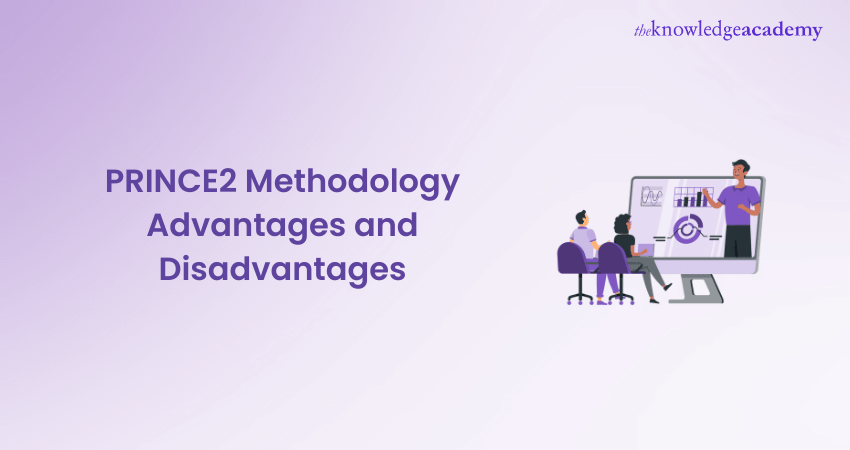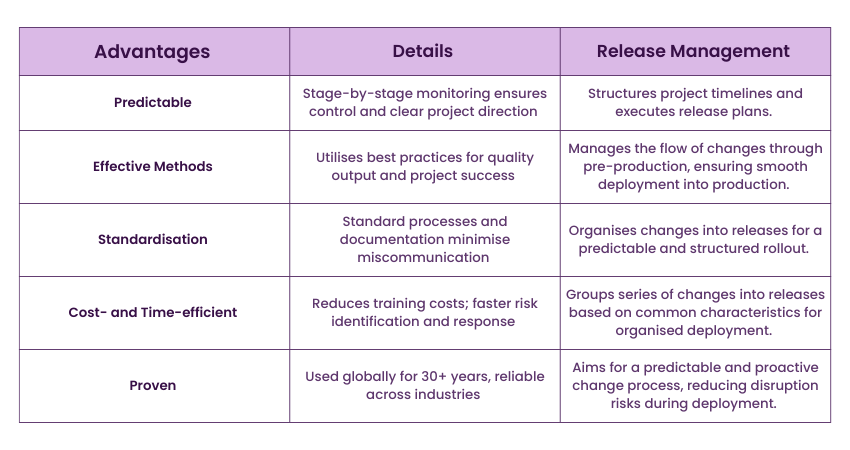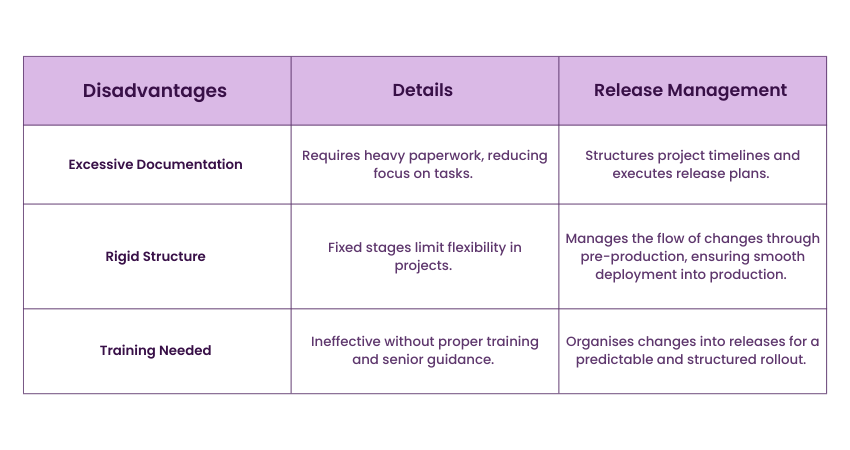We may not have the course you’re looking for. If you enquire or give us a call on +48 221041849 and speak to our training experts, we may still be able to help with your training requirements.
Training Outcomes Within Your Budget!
We ensure quality, budget-alignment, and timely delivery by our expert instructors.

Picture this: your organisation is juggling multiple projects, but chaos seems to reign. Deadlines slip, budgets balloon, and stress levels soar. That’s where the PRINCE2 Methodology comes in. Wondering how this can be the game-changer you need? In our comprehensive blog, we will explore the advantages and disadvantages of adopting this methodology.
Through insightful analysis, we will help you make an informed decision. Dive in to uncover the critical factors that could influence your choice to embrace the PRINCE2 Methodology.
Table of Contents
1) What is PRINCE2 Methodology?
2) When is PRINCE2 Methodology Needed?
3) Important PRINCE2 Elements
a) Principles
b) Themes
c) Processes
4) PRINCE2 Methodology Advantages and Disadvantages
5) Conclusion
What is PRINCE2 Methodology?
So, what exactly is PRINCE2 Methodology, then? There are several ways to apply PRINCE2 techniques. The most crucial aspect is that this is a highly organised Project Management approach utilised for challenging projects in supervised workspaces.
With CEOs, project boards, project managers, group leaders, and team members, it establishes project role hierarchies. Projects are also divided into stages, with distinct procedures for each level.
When is PRINCE2 Methodology Needed?
The ideal time to use PRINCE2 is for managing projects that will primarily require improvements or assistance only when they are required. This means that it's frequently employed in a variety of fields, including governance, building, finance, and IT.
It contrasts with PM techniques that continuously monitor and manage every area of the project. These alternative techniques could be something like Scrum Methodology, which is more service-oriented, or ITIL, the Information Technology Infrastructure Library system.
Important PRINCE2 Elements
The PRINCE2 Project Management Methodology includes three vital elements. Here’s a quick rundown of PRINCE2 elements-
1) Principles
PRINCE2 principles are the influencing ideas of this approach to Project Management. They symbolise the entire dedication to particular working, project-planning, and teamwork methods. The basis of PRINCE2 principles should never be altered or compromised in any way.
2) Themes
Themes of PRINCE2 concentrate on certain points of interest that should be taken into account during the entire project lifecycle. They are not as elevated as principles, but they do require the project team to check on these business objectives on a regular basis. They can be adjusted and customised to fit the project.
Master the methodologies that drive successful projects – sign up for our PRINCE2® Practitioner Training now!
3) Processes
The level of PRINCE2 processes exceeds that of work activities and tasks. The processes are focused on discovering what has to be done, who is accountable, as well as which team members will finish the task. The decision-making process is at the centre of principles, which can be customised for each project.
PRINCE2 Methodology Advantages and Disadvantages
PRINCE2 Methodology Advantages and Disadvantages are as follows-
1) Advantages
By examining its advantages, you can see how PRINCE2 can streamline processes, enhance project control, and improve overall efficiency. Let’s explore them:

1) PRINCE2 is Predictable- The PRINCE2 technique divides projects into stages, allowing for step-by-step monitoring from the start of the project all the way through to its completion. As a result, there is a significantly reduced probability that the project will spin out of control, and it ensures the project is headed in the right direction.
2) Using Effective Methods- A project may only be deemed successful if it produces the quality of output that was anticipated at the outset. The best way to achieve this is through the application of best practices, which is one of the reasons why the PRINCE2 approach has maintained its current level of popularity.
3) Standardisation- Every part of the project was standardised using the methodology to eliminate any possibility of misconceptions or misdirection. It ensures that everyone associated with the project knows what to accomplish and when it should be done, thanks to the standard PRINCE2 vocabulary, a consistent reporting process, and standard documentation.
4) Cost- and Time-efficient- Due to the aforementioned standardisation, it is less expensive and time-consuming to train new staff who are already familiar with the PRINCE2 technique. Since risks would have been discussed from the outset of the project, it takes less time to find them and, if an unanticipated risk does exist, it can be dealt with quickly as one project stage ends and the next one begins. In addition to saving time and money, PRINCE2 advises holding meetings rarely, only when they are absolutely necessary, and to keep them succinct and direct.
5) Tested and Proven- Feedback from Project Management experts from across the world is taken into account whenever this Methodology is amended, ensuring that it does not deviate from lessons gained by people who are well-versed in the Project Management business. As evidence that PRINCE2 is still a widely used Methodology in more than 50 nations all over the world, it has been around for 30 years and is still going strong. It has been recognised as the Project Management approach against which all other methods are assessed and is employed in every industry.
Take the next step in your professional development by joining our PRINCE2® Foundation & Practitioner Training
2) Disadvantages
By recognising the PRINCE2 Methodology’s challenges, you can better prepare for any obstacles that may arise. Let’s delve into the key disadvantages:

1) Excessive Documentation- The PRINCE2 approach is infamous for requiring excessive paperwork throughout the whole project lifecycle. So, if you wish to concentrate more on finishing the project's activities and processes than on documenting them, this methodology is not for you.
2) Extremely Rigid- As we just covered in the benefits, all projects using PRINCE2 follow the same set of project stages. Even though it could save you time, money, and confusion, it is also a highly rigid method to go about things. This is because, despite the fact, it makes no sense, your project must always adhere to the project phases. Unlike several other Project Management approaches, it is not adaptable.
3) Useless Without Training- This methodology is useless if you lack the necessary training on the PRINCE concepts and product phases. Typically, you require a Senior Leader to assist you as you move through each level. However, it's less probable to happen given that these people rarely have personal time to spare.
Conclusion
To wrap up, the PRINCE2 Methodology stands as a beacon of structured project management, offering both significant benefits and notable challenges. By carefully evaluating its pros and cons, you might be able to make a well-informed decision tailored to your organisation’s needs. So, explore its potential and see how it can drive your projects to success.
Navigate complex projects with agility and control – join our PRINCE2 Agile® Foundation and Practitioner Course now!
Frequently Asked Questions

Teams may find PRINCE2's structured approach rigid, making adaptation difficult. Training staff in PRINCE2 principles and ensuring effective communication can be challenging. Tailoring the methodology to specific projects requires balancing standard practices with practical needs.

Organisations should consider project size, existing management culture, and resources. PRINCE2's clear framework suits larger projects but may be excessive for smaller ones. Assessing training needs and integration with current practices is essential.

The Knowledge Academy takes global learning to new heights, offering over 30,000 online courses across 490+ locations in 220 countries. This expansive reach ensures accessibility and convenience for learners worldwide.
Alongside our diverse Online Course Catalogue, encompassing 19 major categories, we go the extra mile by providing a plethora of free educational Online Resources like News updates, Blogs, videos, webinars, and interview questions. Tailoring learning experiences further, professionals can maximise value with customisable Course Bundles of TKA.

The Knowledge Academy’s Knowledge Pass, a prepaid voucher, adds another layer of flexibility, allowing course bookings over a 12-month period. Join us on a journey where education knows no bounds.

The Knowledge Academy offers various PRINCE2® Trainings, including the PRINCE2® Foundation & Practitioner Training, PRINCE2 Agile® Foundation and Practitioner Course, and PRINCE2® Foundation Training. These courses cater to different skill levels, providing comprehensive insights into PRINCE2 Portfolio Management.
Our Project Management Blogs cover a range of topics related to PRINCE2, offering valuable resources, best practices, and industry insights. Whether you are a beginner or looking to advance your Project Management skills, The Knowledge Academy's diverse courses and informative blogs have got you covered.
Upcoming Project Management Resources Batches & Dates
Date
 PRINCE2® Foundation & Practitioner Training Course
PRINCE2® Foundation & Practitioner Training Course
Mon 6th Jan 2025
Sat 11th Jan 2025, Sun 12th Jan 2025
Mon 13th Jan 2025
Mon 20th Jan 2025
Mon 27th Jan 2025
Mon 3rd Feb 2025
Sat 8th Feb 2025, Sun 9th Feb 2025
Mon 10th Feb 2025
Mon 17th Feb 2025
Mon 24th Feb 2025
Mon 3rd Mar 2025
Sat 8th Mar 2025, Sun 9th Mar 2025
Mon 10th Mar 2025
Mon 17th Mar 2025
Mon 24th Mar 2025
Mon 31st Mar 2025
Sat 5th Apr 2025, Sun 6th Apr 2025
Mon 7th Apr 2025
Mon 14th Apr 2025
Tue 22nd Apr 2025
Mon 28th Apr 2025
Sat 3rd May 2025, Sun 4th May 2025
Tue 6th May 2025
Mon 12th May 2025
Mon 19th May 2025
Tue 27th May 2025
Mon 2nd Jun 2025
Sat 7th Jun 2025, Sun 8th Jun 2025
Mon 9th Jun 2025
Mon 16th Jun 2025
Mon 23rd Jun 2025
Mon 30th Jun 2025
Sat 5th Jul 2025, Sun 6th Jul 2025
Mon 7th Jul 2025
Mon 14th Jul 2025
Mon 21st Jul 2025
Mon 28th Jul 2025
Sat 2nd Aug 2025, Sun 3rd Aug 2025
Mon 4th Aug 2025
Mon 11th Aug 2025
Mon 18th Aug 2025
Tue 26th Aug 2025
Mon 1st Sep 2025
Sat 6th Sep 2025, Sun 7th Sep 2025
Mon 8th Sep 2025
Mon 15th Sep 2025
Mon 22nd Sep 2025
Mon 29th Sep 2025
Mon 6th Oct 2025
Sat 11th Oct 2025, Sun 12th Oct 2025
Mon 13th Oct 2025
Mon 20th Oct 2025
Mon 27th Oct 2025
Sat 1st Nov 2025, Sun 2nd Nov 2025
Mon 3rd Nov 2025
Mon 10th Nov 2025
Mon 17th Nov 2025
Mon 24th Nov 2025
Mon 1st Dec 2025
Sat 6th Dec 2025, Sun 7th Dec 2025
Mon 8th Dec 2025
Mon 15th Dec 2025







 Top Rated Course
Top Rated Course



 If you wish to make any changes to your course, please
If you wish to make any changes to your course, please


